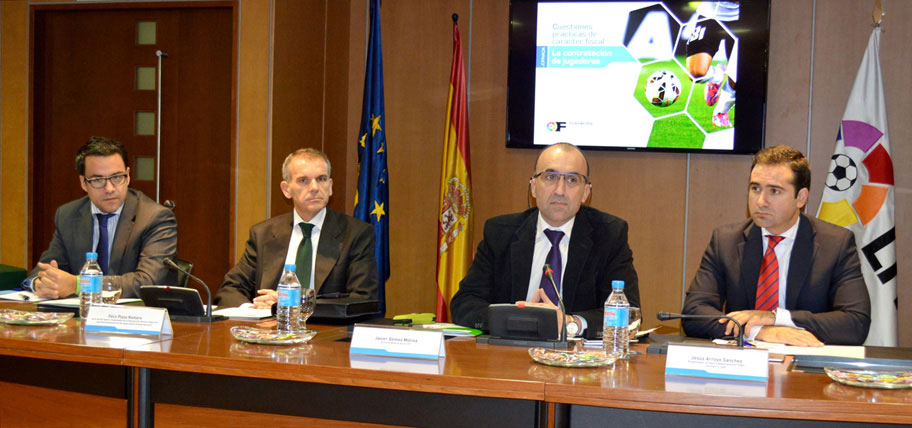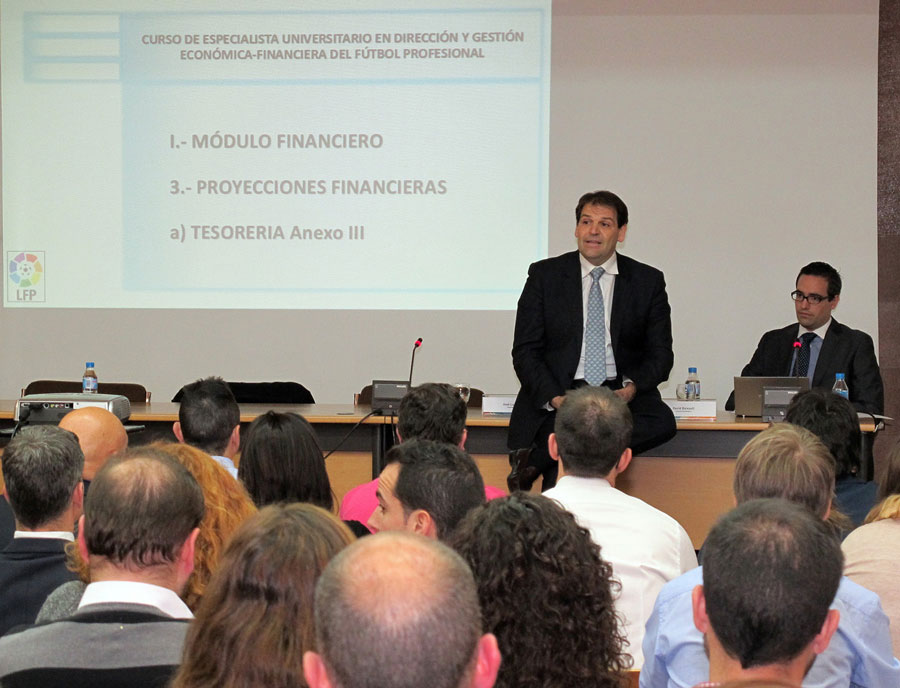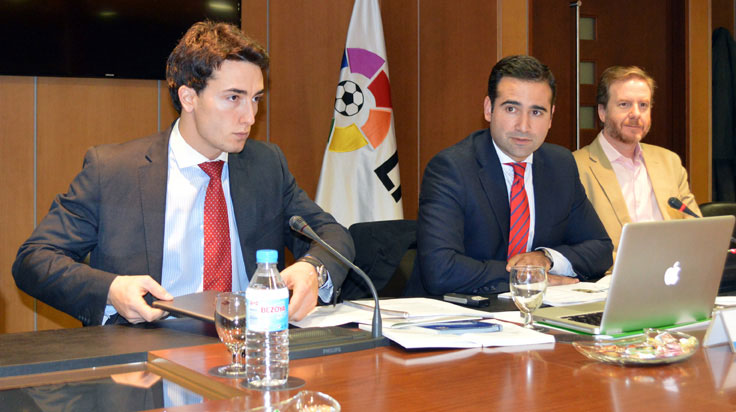GENERAL DIRECTORATE
 The work carried out by the Corporate General Directorate during the 2014/15 season followed two main lines of action. On the one hand, consolidation and support of the initial momentum behind the projects carried forward from previous seasons. On the other hand, strengthening the work of LaLiga in those areas identified as strategic by current management.
The work carried out by the Corporate General Directorate during the 2014/15 season followed two main lines of action. On the one hand, consolidation and support of the initial momentum behind the projects carried forward from previous seasons. On the other hand, strengthening the work of LaLiga in those areas identified as strategic by current management.
In this respect and to the extent that the economic and financial sustainability of professional football is one of the strategic goals of LaLiga, a great deal of those projects focuses on this area.
This means, for instance, that the financial control regulation has evolved as a result of the experience arising from the application of such regulations during previous seasons. Such progress has meant a better adaptation to the clubs’ interests, the overall financial situation and LaLiga’s sustainability goals already mentioned. Again, such progress has mainly been shown by an improvement of the shareholding contribution in order to widen the cost cap on sports personnel and by clarification of the criteria for the excess of substitutions owing to long-term injury periods, replacement of coaches or contract renewals occurred during the season. For this season and after a transitional period, the subsequent review of the 2013/14 season has produced an analysis of the break-even point for the first time.
It is important to highlight in this respect that the aggregate club net debt of LaLiga has kept a downward trajectory during the 2011/12 to 2013/14 seasons, from €3,315 million to €2,757 million, respectively. That means a reduction of €558 million that is expected to be maintained for the 2014/15 season.
Secondly and on the same topic, we have also continued our efforts on digitisation of the work of LaLiga’s departments. In this respect, a new tool for economic control was created, a tool that allows us to tap deeply into our current data. Other tools were developed, namely one for Competitions and another one for the Monitoring of Charges.
The development of the Competition IT application is a project arising in the previous season as a response to the need for linking the tasks of the Competitions departments (football federation data) and the Economic Control departments (financial data). The first version of the tool was created during the 2014/15 season as a replacement of the tool in place until then. This computer application facilitates the registration and data collection processes and it also increases the knowledge concerning the financial aspects of sports personnel and their historical analysis. It is currently up and running and it will be used for the first time during the summer transfer period of the 2015/16 season (July-August 2015).
In turn, we have developed a tool for the Monitoring of Charges that provides a follow-up, update, control and query of all data relevant to this area as a consequence of the need for strict control of the charges registered over the rights owned by the clubs and SADs members of LaLiga as well as the debt giving rise to such charges and as a consequence of the commitment undertaken by LaLiga’s current management with Public Administration entities.
Lastly, the protocol signed by the Higher Sports Council and LaLiga that enables the holding of regular meetings (mainly on a quarterly basis) is still current. Such meetings serve as an audit of the clubs’ and SADs financial situation, allowing for a deeper insight into the general situation of the clubs and a greater awareness of the clubs directors of the need to face certain issues assertively. In some cases, such monitoring, more intense for clubs with identified problems, has meant certain measures to address situations such as the request for corrective action, forensic audits or disciplinary proceedings, to name a few.
For the latter, we have strengthened the relations between the Legal, the Economic Control and the Monitoring of Charges departments of LaLiga in order to identify and correct any punishable behaviour in a bid to achieve a competition in which we can ensure adherence to the same regulations by all.
Another area where important efforts have been made –besides control– is the area of transparency and communication in terms of the financial situation of clubs and SADs, as well as of the relevance of professional football in Spanish society. In this respect, we prepared two reports for the global dissemination of such insights amongst those involved, entities and people, fans and society at large. Namely, the reports are “LaLiga. 2014 Professional Football Financial Report” and “Socioeconomic Impact of Professional Football in Spain”.
The former has been fully drafted by LaLiga with the information supplied by clubs and SADs. The first copy of this report includes information on the 2011/12, 2012/13 and 2013/14 seasons and it was created with a view to producing such report annually so as to communicate the development of the financial situation of professional football. It is important to point out that from the results used for said report it can be observed how Spanish professional football has been able to keep on growing steadily in terms of revenue and debt reduction, despite the global economic crisis.
The latter report was drafted by KPMG using its own methodology and on the basis of sectorial insights of LaLiga’s personnel and the information from the 2010/11, 2011/12 and 2012/13 seasons. The aim of that report is to establish the direct, indirect and induced impact of professional football on the Spanish economy and on public institutions in terms of the revenue collected. Generally speaking, this study has concluded that in 2013 professional football generated over €7.6 billion, a 0.75% of the Spanish GDP, more than 140.000 full-time jobs and it also meant an income of €2,896 million straight into public funds, showing itself as one of the main sectors of the Spanish economy.
Still in the area of finance, the 2014/15 season saw the creation of a Human Resources Department within LaLiga. For this we hired the services of an expert, who started working in June 2015. Several projects have been set in motion and below we mention two of them.
On the one hand, we have implemented an analytical control by management and department sections. Such analytical control has implied a detailed budget proposal that has been started for all management and department sections and that, in the aggregate, has led to the formulation of a budget for LaLiga. As any other analytical control, it allows us to know the origin of the organisation’s funds in detail and also the destination of the same. We are able to examine the results obtained from such allocation. Furthermore, we can find out how all management and department sections are progressing in their performance on a regular basis against budget targets.
On the other hand, we have classified and reviewed all current contracts. Now we know the level of performance of such contracts at all times and the rights and obligations arising from them.

